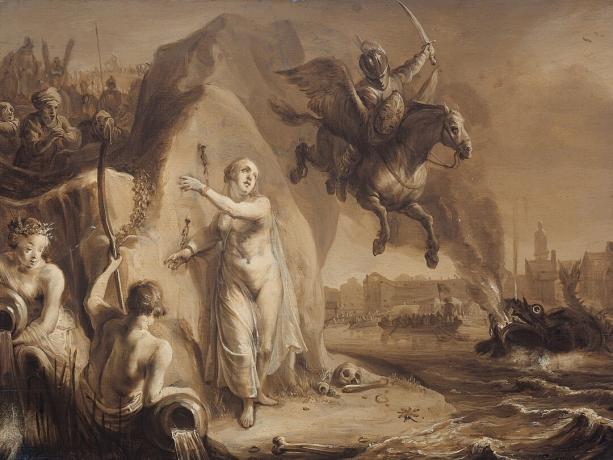Perseus is a hero of greek mythology, whose legends and adventures have enchanted generations over the centuries. He is known for his exceptional courage and abilities, facing extraordinary challenges and triumphing over adversity.
In mythology, it is a demigod, divine-human mixture characteristic of many of the Greek heroes, giving them exceptional abilities and a direct connection with the gods.

refers to legendary events that took place around the 14th century BC. W.
The time in which the Perseus stories unfold, around the 14th century BC. C., is permeated by legends that shaped ancient Greek culture and society. Mythology, then, played an important role in the lives of the ancient Greeks, influencing their beliefs, religious practices and art.
Origin and lineage of Perseus
The hero has an intriguing origin and a divine lineage that plays a key role in his adventures. His parents contribute to his story, connecting him to both the divine and human worlds.
Perseus is the son of Zeus, the mighty god of thunder and ruler of Olympus. The mother, danae, was the daughter of King Acrisius of Argos. The king, worried about a prophecy that predicted his grandson would kill him, locked the princess in a bronze tower to prevent her from having children. However, the god of gods, attracted by her beauty, managed to enter the tower in the form of a golden rain and conceived Perseus.

Perseus' divine descent attributes him superhuman abilities, extraordinary courage, and the protection of the gods. In addition to his divine father, Perseus received help and special gifts from the gods during his adventures.
Perseus and Medusa: Beheading the Gorgon

The Greek hero is known for a series of heroic deeds that demonstrate his bravery, cunning and determination.
Medusa's beheading is one of the most famous and impactful episodes in the history of Perseus. The creature was one of the three Gorgons, creatures with serpents for hair and the power to turn anyone who looked into their eyes to stone. The hero was tasked with beheading her and bringing her head as a gift to King Polydectes.
To fulfill this dangerous task, he enlisted the help of the gods. He was given a sharp sword and mirrored shield by Athena, which allowed him to look at Medusa without being turned to stone. In addition, Hermes provided him with winged sandals and Hades, the god of the underworld, gave him a helmet that made him invisible.
With these divine weapons, she approached the cave where the monstrous sisters dwelled. Using his shield to avoid the petrifying gaze, he silently approached and, with a single, well-aimed blow, severed the monster's head. From the blood originated the winged horse Pegasus and the golden giant Chrysaor.
Medusa's head possessed magical powers and was a valuable object. This achievement solidified the demigod's reputation as one of the great heroes of Greek mythology.
Andromeda's Rescue

Andromeda was an Ethiopian princess, daughter of King Cepheus and Queen Cassiopeia. However, his mother, arrogant and vain, claimed that her daughter was more beautiful than the Nereids, the daughters of the sea god Nereus. This aroused the wrath of the goddesses, who asked Poseidon to punish the queen's arrogance.
As a consequence, lord of the seas sent a terrible sea monster, Ceto, to destroy the coast of Ethiopia. The king, desperate, consulted an oracle, being informed that the only way to save his kingdom was to offer his daughter as a sacrifice to the monster.
Perseus was returning from a mission when he spotted the desperate princess chained to a rock by the sea. He fell in love with her at first sight. The demigod offered to rescue her and defeat the monster.
Using his divine weapons, the hero confronted the beast and, with great courage, managed to defeat it, freeing Andromeda. As a result, he took her as his wife, taking her with him to Greece, where they lived happily.
Symbolism and legacy
The myth of the son of Zeus has a deep symbology, as his adventures reflect universal themes such as courage, heroism and triumph over evil.
Perseus is the representation of the classic civilizing hero. This myth plays a key role in the founding of city-states during the Mycenaean period.
He personifies the ability to face seemingly insurmountable challenges, demonstrating that, with determination, skill and the help of the gods, it is possible to overcome terrible obstacles. The demigod is therefore an inspiring example of bravery in the face of the unknown, of the courage needed to face the challenges we encounter in our own lives.
The death of Medusa, in more recent times, is interpreted from a new and different perspective: as a symbol of the feminine principle dominated and subjugated by the hegemonic power of patriarchy.
The hero's legacy transcends mythology and extends to arts and culture. His stories are referenced and reinterpreted over the centuries in literature, providing inspiration for renowned works. Furthermore, the iconic image of Perseus holding Medusa's head is represented in paintings and sculptures, being a recurring theme in visual art.
Cinema also brought the adventures of the son of Zeus to the big screen, adapting his stories for contemporary audiences. His artistic legacy is a testament to his enduring relevance and how his stories continue to captivate and inspire the human imagination.
Bibliography:
- BULFLINCH, Thomas. The Golden Book of Mythology. Rio de Janeiro: Ediouro, 2006.
- JAEGER, Werner. Paideia: the formation of the Greek man. São Paulo: Martins Fontes, 2013.
See too:
- Mythology
- Greek mythology
- Greek gods
- Artemis
- Athena
- hades
- Loki


